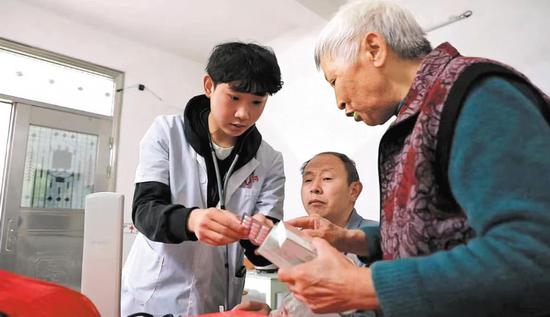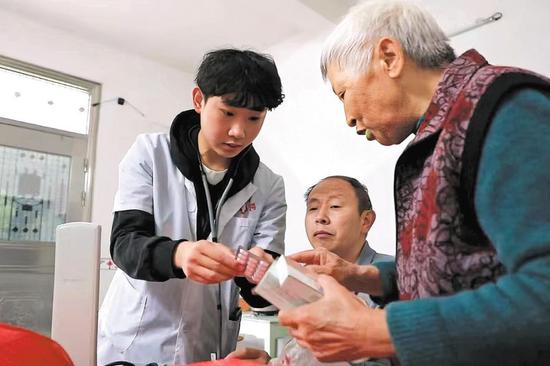Village doctor dedicated to rural community
Medical professional provides crucial lifeline to those living in countryside

Hu Yiwen (left) instructs a patient on medication usage at the patient's home in Yichun, Jiangxi province. (CHINA DAILY)
On a chilly midnight in early spring, village doctor Hu Yiwen received a call and quickly left home on his motorcycle.
Tongmu village, located in Yichun city, Jiangxi province, is home to just over 200 residents, more than 100 of whom are elderly individuals aged 60 and above.
The caller was the son of 74-year-old Yu Rongying, who reported that his mother was unable to eat and was coughing severely.
Upon arriving at the elderly woman's home, Hu discovered that she had difficulty swallowing due to the aftermath of a stroke and needed a gastric tube. He promptly provided treatment, alleviating the patient's suffering.
Caring for the health of the elderly in the village is a crucial part of this young doctor's daily routine.
Born in 1999 in another village in Yichun, Hu is the sole medical provider serving Tongmu.
Growing up in a rural area, he experienced a lack of medical resources in his childhood, which motivated him to become a village doctor after graduating from Yichun Vocational College in 2020.
From the start, Hu's journey was challenging.
"The clinic's equipment was in disrepair, and medical services were almost nonexistent. I was so nervous that my palms were sweating the first time I went out to see patients alone," Hu said.
Another challenge was his youthful appearance.
"During consultations, villagers often didn't trust or cooperate with me because they saw me as a young man and mistook me for an intern," the 25-year-old said.
Residents in the small village are scattered: some live on hillsides, while others travel several kilometers by motorcycle to reach the clinic.
"My job is to be in the health center, but many elderly people have mobility issues and can't come to the center, so I have to make house calls," Hu said.
Whenever villagers need him, Hu is on call. He is well-acquainted with the villagers' circumstances, such as families with centenarians, those frequently working away and pregnant women about to give birth.
"Whenever patients need me, I make house calls. My phone stays on all night, placed by my bedside so I can answer calls at any time."
Hu recalled a memorable experience from last November when he visited 73-year-old Zhong Chengyun and suspected a stroke. He promptly arranged for urgent care at Fengxin County People's Hospital, ensuring Zhong received timely treatment.
One villager with skin cancer has received Hu's dedicated care, including regular visits to adjust treatment and provide emotional support.
"Although our village's medical resources may not be as advanced as those in big hospitals, I strive to be patient, meticulous and compassionate," Hu said.
Over the past four years, he has also participated in training sessions at township hospitals to enhance his medical skills.
According to the national census in 2020, the proportion of people aged 60 and above in rural areas was 23.8 percent, nearly 8 percentage points higher than that in urban areas.
Since 2021, China has been focusing on adjusting its poverty alleviation measures to align with the goal of rural vitalization, while also strengthening the provision of basic healthcare in rural areas.
The National Health Commission, along with four other government departments, launched a plan in April last year to nurture college-educated rural doctors, and nearly 7,500 graduates have been hired.
When asked why he didn't pursue a job in a big city after graduating, Hu shared that his dream was to be a rural doctor and improve healthcare for those with the most need for it.
"As long as the villagers need me, I'll be there," Hu said.

